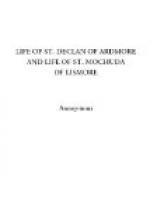38. On another day there came a woman to Declan’s monastery not far from the city where she dwelt. She committed a theft that day in Declan’s monastery as she had often done previously, and this is the thing she stole—a “habellum” [possibly an item of tribute]; she departed homewards taking it with her and there met her a group of people on the highway, and the earth, in their presence, swallowed her up, and she cast out the tabellum from her bosom and it was quickly turned into a stone which the wayfarers took and brought with them to Declan. Declan himself had in supernatural vision seen all that happened to the woman in punishment of her theft, and the name of Declan was magnified owing to those marvels so that fear took possession of all-those present and those absent. The stone in question remains still in Declan’s graveyard in his own town of Ardmore-Declain, where it stands on an elevated place in memory of this miracle.
39. A rich man named Fintan was childless, for his wife was barren for many years. He himself, with his wife, visited Declan and promised large alms and performance of good works provided he (Declan) would pray that they might have children: they held it as certain that if Declan but prayed for them God would grant them children. Declan therefore, praying to God and blessing the pair, said: “Proceed to your home and through God’s bounty you shall have offspring.” The couple returned home, with great joy for the blessing and for the promise of the offspring. The following night, Fintan lay with his wife and she conceived and brought forth twin sons, scil.: Fiacha and Aodh, who, together with their children and descendants were under tribute and service to God and Declan.




